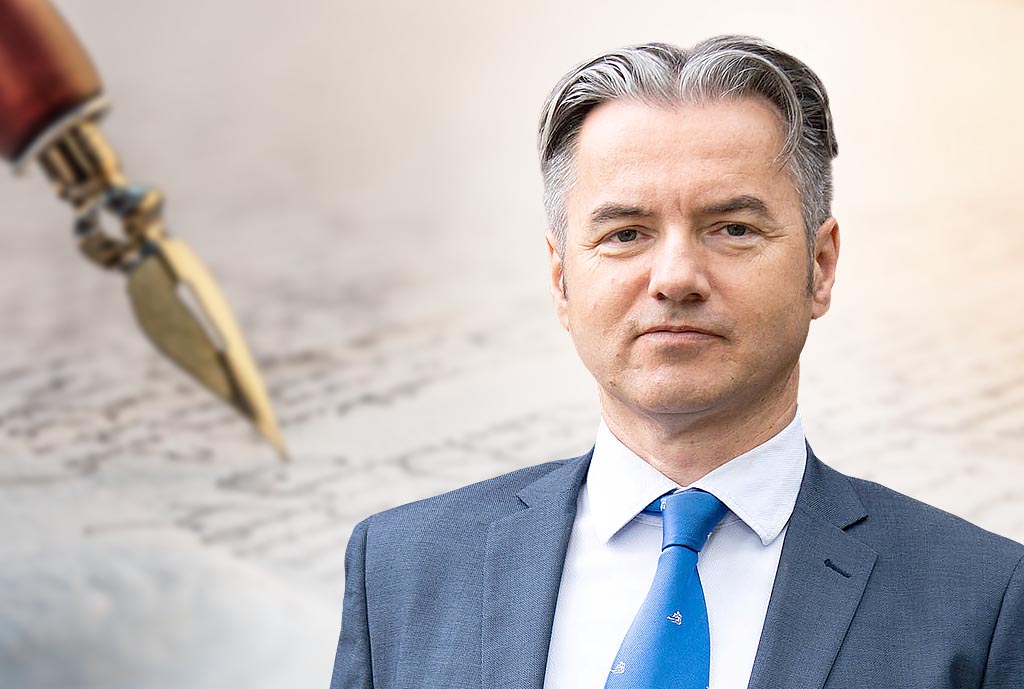By: Dr. Metod Berlec
The cover of this week’s Demokracija and its lead article highlight the predatory tax policies pursued by Golob’s leftist government. The ruling coalition, comprising the Gibanje Svoboda, SD, and Levica, has ushered us into 2025, much like in previous years, with higher taxes and contributions.
The mandatory healthcare contribution, formerly voluntary, has risen and must now also be paid by retirees. From mid-2025, retirees will also face a compulsory long-term care contribution deducted directly from their net pensions, raising questions about the constitutionality of such measures. In addition, the RTV license fee will increase by 10%, electricity bills are higher due to the network charge tax, and the government is planning new taxes on property and even dogs. Sweet and energy drinks will become more expensive due to a higher VAT rate. Entrepreneurs and businesses are also feeling the pinch. Prime Minister Robert Golob’s philosophy on taxes, famously stated on April 14th, 2022 – just ten days before the last parliamentary elections – has come to fruition: “I really do not know what good lower taxes would do me, except to leave more money in my account that I would probably waste on bigger nonsense.” At the time, most citizens either ignored or did not believe this statement. Now, as Prime Minister, Golob is delivering on higher taxes, leaving both citizens and the economy reeling. The government punishes hardworking individuals while rewarding idlers and welfare cheats with social benefits.
Meanwhile, the spectacle surrounding Golob and his partner Tina Gaber on social media has become almost farcical. The couple shares heavily photoshopped images that resemble something out of a tabloid. A recent example is their New Year’s greeting in front of a Christmas tree at Ljubljana’s Prešeren Square. The square appeared completely empty – a clear fabrication, as it was certainly bustling on December 31st, 2024. The photo was likely taken earlier or digitally altered, and Golob was noticeably made to appear taller than Gaber, despite being shorter in reality. Something similar happened in early December, when Gaber and Golob were in Paris (at one of the events marking the official reopening of the famous Notre-Dame Cathedral, which was destroyed by fire over five years ago). French President Emmanuel Macron introduced them to newly elected U.S. President Donald Trump. In that photograph as well, Golob was digitally enhanced (via Photoshop or photo editing) to appear nearly as tall as Trump. In reality, Golob stands at 172 cm, while Trump is over 190 cm tall. It seems the Prime Minister has a height-related inferiority complex, which he attempts to compensate for in other ways – through an obsession with money and increasingly apparent authoritarian arrogance.
But let’s leave that aside. For those of us working in the media, the current proposal for the media law, approved by Golob’s government on New Year’s Eve – via correspondence session, no less – and sent to the National Assembly for consideration, is undoubtedly highly problematic. Dominant media outlets uncritically parroted the words of the Minister of Culture, Asta Vrečko, who claimed it to be the “most modern media law in Europe”. This, of course, is far from the truth. As journalist and editor of Spletni časopis, Peter Jančič, aptly wrote a few days ago, the real purpose of the law is “primarily to ensure additional funding for leftist tycoons who own all the daily newspapers, as print media is losing readers significantly, as well as for the ‘right’ media”. He continued, “For example, funds would supposedly be allocated for digitalisation. All print media have long been digitalised and accessible online. The government would distribute money even more extensively than before via the pluralisation fund. It is well-known that this does not ensure pluralism. On the contrary, it predominantly finances leftist media. Right-leaning media, which are few – such as Planet TV, Demokracija, and Nova24TV – are practically excluded altogether. The government is trying to disable right-leaning media in other ways as well. They are being investigated in parliament. If they could, they would probably ban media that are not ‘ours’, as was the case during the socialist dictatorship after the war.” Millions will be allocated from the budget for “obedient media” that follow the government’s directives, while “disobedient” media, critical of the authorities, are likely to face numerous provisions in the new draft law aimed at making their lives difficult or silencing them altogether. They even want to muzzle social media users and so-called influencers (fran.si: someone who, due to their reputation within a network of followers or readers, especially on social media, significantly influences their decisions or lifestyle). We cover this issue in detail in the magazine. In short, the future does not look promising!

